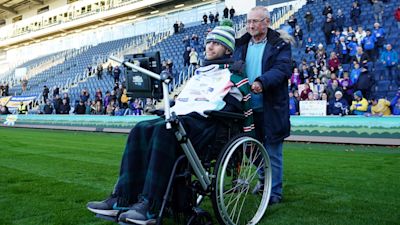Family of Leeds Rhinos legend Rob Burrow challenges ministers to fulfil £50m MND pledge

Video report by Lisa Adlam
The father of rugby league legend Rob Burrow has challenged the government to deliver on its promise to plough £50million into researching motor neurone disease (MND).
Geoff Burrow said his family had been left "frustrated" by delays in fulfilling a pledge made by Boris Johnson last November.
The Prime Minister said funding would "turbo-charge" the search for new therapies and drugs to improve the life chances of those who are diagnosed with the "cruel and debilitating" illness.
But he has faced criticism from the family of former Leeds Rhinos player Burrow, whose own high-profile battle with MND has helped to raise awareness of the condition and millions of pounds for charity.
In June, Burrow's father, Geoff, tweeted that he was "disgusted" that no money had been provided, asking whether the pledge was a "cruel sick lie".
Today, 5 July, he told ITV News: "This government - and I'm not being political, I've no time for being political – does need to come through with some of their promises."
He added: "People with MND can't wait this length of time."
MND attacks the nervous system and affects around 5,000 people in the UK. There is currently no cure.
Rob Burrow, who was diagnosed with the condition in 2019, is now dependent on a wheelchair, able to communicate only through an eye-driven communication device and is cared for full-time by his wife, Lindsey.
But he has continued to campaign, along with his former teammate, Kevin Sinfield, to raise awareness of the disease and is spearheading fundraising for a new specialist centre in his home city of Leeds.
The government has pledged to create a new unit to attract more innovative research applications for the funding.
After recent soundings from the government, Geoff Burrow said he was "hopeful" funding was on its way.
He said: "There's a lot of things happening in the world, so it can't be about MND all the time, but it is for us. We see the devastating impact it has on Rob and others and the family but Rob and Kevin and all the other people are making a big difference."
Chris James of the charity the MND Association, added: "We really feel like we're on the cusp of a moment where we will be able to find treatments for some forms of MND and that's really important. But we need researchers to be able to access the funds that they desperately need very quickly."
A spokesman for the Department of Health said the government had invested millions of pounds in MND research already, leading to major advances in how the disease is understood, and remained committed to spending at least another £50 million to help find a cure.
"We've partnered with charities to launch a new £4million MND partnership, backed by £1million of government funding, which brings researchers together to work on speeding up the development of new treatment," the spokesperson said.
"Funding is available now and researchers can apply to the National Institute for Health and Care Research and UK Research and Innovation."